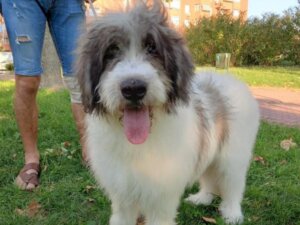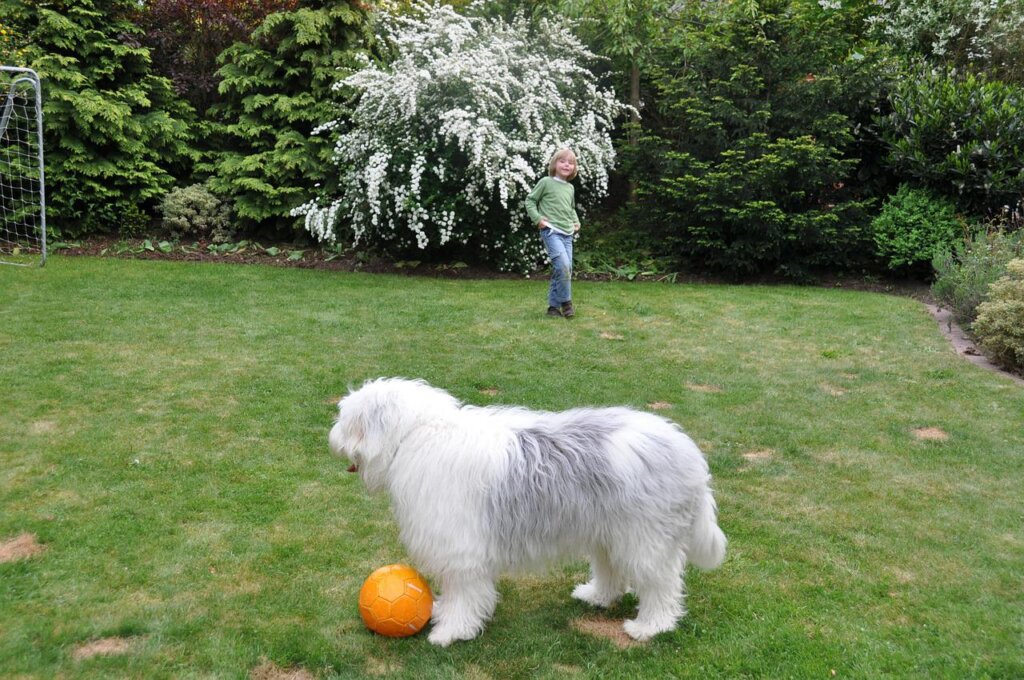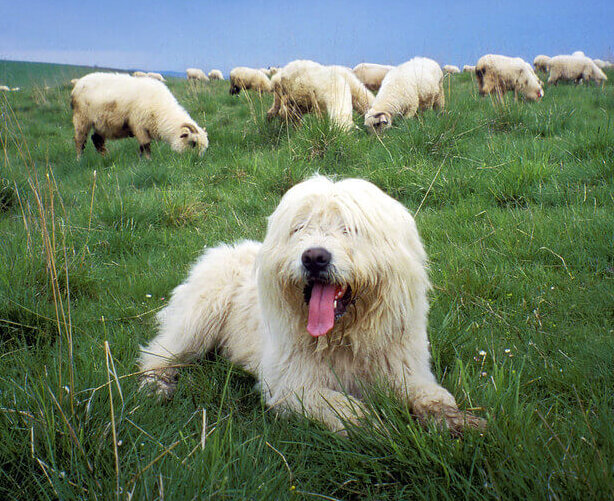All About the Romanian Mioritic Shepherd Dog


Written and verified by the biologist Cesar Paul Gonzalez Gonzalez
The Romanian Mioritic Shepherd Dog is a sheepdog characterized by a long coat and a beautiful demeanor. This breed is quite appreciated in its place of origin, as they were bred with the purpose of guarding the flock in the mountains. In addition, their temperament is quite calm and they’re easy to train.
The breed was recognized in 2005 by the Fédération Cynologique Internationale, which means that it’s relatively new to the international community. For this reason, it’s usually not so well known in countries other than Romania. Read on and learn more about the Romanian Mioritic Sheepdog.
Origin of the breed
The Romanian Mioritic Shepherd dog was selectively bred in the Carpathian Mountains, where the aim was to produce a breed that would take good care of the flock while grazing. For years, it was considered to be the best sheepdog in Romania, so it gained great popularity in its native area.
This breed is considered to be one of the oldest Romanian breeds, whose origin could be found in ancient Asian dogs. However, the Romanian Mioritic Shepherd dog wasn’t introduced to the world until 1935 at an exhibition in Bucharest. This event wasn’t very well known because of the Second World War, so it remained anonymous for a long time.
It wasn’t until 1981 that it was registered in the Romanian Cynological Association, but it wasn’t until 2002 that it was proposed internationally. Today, the Fédération Cynologique Internationale recognizes it as a valid breed that is part of group 1 (sheepdogs).
Characteristics of the Romanian Mioritic Shepherd dog
This breed is characterized by a vigorous demeanor, large size, and long coat. Their body is rectangular in shape, with long shoulders, a large head, and light brown eyes. They measure on average between 60 and 80 centimeters (2 – 2.6 feet) in height at the withers, while their weight exceeds 60 kilograms (132 pounds).
This dog’s coat is quite dense and bulky, but feels rough to the touch. It exhibits white or gray colorations, although it’s also possible to have a combination of both shades. Contrary to what one might think, this dog’s coat doesn’t shed very easily. However, it isn’t considered hypoallergenic.

Breed behavior
The breeding process that the Romanian Mioritic Shepherd dog underwent has transformed the breed into one of the most loyal, obedient, and affectionate breeds in existence. Thanks to this, it’s capable of acting as a guardian of the flocks and guiding them safely. In addition, it tends to form a particularly close relationship with family members.
The vigorous demeanor of this dog comes from the great amount of physical activity it’s exposed to. For this reason, to keep them as a pet you need to provide them with several walks, as well as exercise and games that will use up their energy. Rural environments may be the best for this purpose, as urban environments lack space and restrict their freedom.
In general, the breed has balanced traits that make it an excellent and affectionate companion. It does, however, require proper training to control all of its protective behavior. Otherwise, it could start to show problems of aggression towards strangers.
Care of the Romanian Mioritic Shepherd dog
As you can imagine, the care of this breed is centered on caring for its coat and providing it with sufficient exercise. The length of its coat obliges the guardians to brush it on a daily basis to avoid tangles. Also, the dog needs to go for a walk at least once a day, apart from its play sessions.
The Romanian Mioritic Shepherd dog isn’t suitable for life in small houses or apartments, as it needs a large space where it can run and enjoy its freedom. Remember that they’re used to living in the countryside, so they won’t accept confinement well. Don’t adopt one if you can’t offer them these conditions.

Health problems in the breed
This dog is susceptible to the pathologies that affect most large dogs, such as hip dysplasia, elbow dysplasia, and gastric torsion. Other than these problems, the breed doesn’t exhibit any serious or genetic conditions at present.
Of course, if they’re employed as a working (shepherd) dog, it’ll be necessary to always check their body thoroughly when they return. In this way, you can identify any wounds, lacerations or thorns that may have injured them while they were herding. It’s especially important to check their paws and ears, as these are the most exposed areas and most susceptible to damage.
Some people consider the Romanian Mioritic Shepherd dog to be quite healthy and hardy. However, it’s always good to check their health with the help of a veterinarian to confirm that everything is in order. Remember that the coat could become a factor that could lead to the presence of parasites; but with preventive care, it shouldn’t affect their health.
As you can tell, the Romanian Mioritic Shepherd dog is a rather peculiar and ostentatious breed. However, its physical characteristics are more geared to life in rural environments, so not just anyone can keep it as a pet. Still, it’s clear that it’s a good life companion and would make any owner happy to give it a chance.
The Romanian Mioritic Shepherd Dog is a sheepdog characterized by a long coat and a beautiful demeanor. This breed is quite appreciated in its place of origin, as they were bred with the purpose of guarding the flock in the mountains. In addition, their temperament is quite calm and they’re easy to train.
The breed was recognized in 2005 by the Fédération Cynologique Internationale, which means that it’s relatively new to the international community. For this reason, it’s usually not so well known in countries other than Romania. Read on and learn more about the Romanian Mioritic Sheepdog.
Origin of the breed
The Romanian Mioritic Shepherd dog was selectively bred in the Carpathian Mountains, where the aim was to produce a breed that would take good care of the flock while grazing. For years, it was considered to be the best sheepdog in Romania, so it gained great popularity in its native area.
This breed is considered to be one of the oldest Romanian breeds, whose origin could be found in ancient Asian dogs. However, the Romanian Mioritic Shepherd dog wasn’t introduced to the world until 1935 at an exhibition in Bucharest. This event wasn’t very well known because of the Second World War, so it remained anonymous for a long time.
It wasn’t until 1981 that it was registered in the Romanian Cynological Association, but it wasn’t until 2002 that it was proposed internationally. Today, the Fédération Cynologique Internationale recognizes it as a valid breed that is part of group 1 (sheepdogs).
Characteristics of the Romanian Mioritic Shepherd dog
This breed is characterized by a vigorous demeanor, large size, and long coat. Their body is rectangular in shape, with long shoulders, a large head, and light brown eyes. They measure on average between 60 and 80 centimeters (2 – 2.6 feet) in height at the withers, while their weight exceeds 60 kilograms (132 pounds).
This dog’s coat is quite dense and bulky, but feels rough to the touch. It exhibits white or gray colorations, although it’s also possible to have a combination of both shades. Contrary to what one might think, this dog’s coat doesn’t shed very easily. However, it isn’t considered hypoallergenic.

Breed behavior
The breeding process that the Romanian Mioritic Shepherd dog underwent has transformed the breed into one of the most loyal, obedient, and affectionate breeds in existence. Thanks to this, it’s capable of acting as a guardian of the flocks and guiding them safely. In addition, it tends to form a particularly close relationship with family members.
The vigorous demeanor of this dog comes from the great amount of physical activity it’s exposed to. For this reason, to keep them as a pet you need to provide them with several walks, as well as exercise and games that will use up their energy. Rural environments may be the best for this purpose, as urban environments lack space and restrict their freedom.
In general, the breed has balanced traits that make it an excellent and affectionate companion. It does, however, require proper training to control all of its protective behavior. Otherwise, it could start to show problems of aggression towards strangers.
Care of the Romanian Mioritic Shepherd dog
As you can imagine, the care of this breed is centered on caring for its coat and providing it with sufficient exercise. The length of its coat obliges the guardians to brush it on a daily basis to avoid tangles. Also, the dog needs to go for a walk at least once a day, apart from its play sessions.
The Romanian Mioritic Shepherd dog isn’t suitable for life in small houses or apartments, as it needs a large space where it can run and enjoy its freedom. Remember that they’re used to living in the countryside, so they won’t accept confinement well. Don’t adopt one if you can’t offer them these conditions.

Health problems in the breed
This dog is susceptible to the pathologies that affect most large dogs, such as hip dysplasia, elbow dysplasia, and gastric torsion. Other than these problems, the breed doesn’t exhibit any serious or genetic conditions at present.
Of course, if they’re employed as a working (shepherd) dog, it’ll be necessary to always check their body thoroughly when they return. In this way, you can identify any wounds, lacerations or thorns that may have injured them while they were herding. It’s especially important to check their paws and ears, as these are the most exposed areas and most susceptible to damage.
Some people consider the Romanian Mioritic Shepherd dog to be quite healthy and hardy. However, it’s always good to check their health with the help of a veterinarian to confirm that everything is in order. Remember that the coat could become a factor that could lead to the presence of parasites; but with preventive care, it shouldn’t affect their health.
As you can tell, the Romanian Mioritic Shepherd dog is a rather peculiar and ostentatious breed. However, its physical characteristics are more geared to life in rural environments, so not just anyone can keep it as a pet. Still, it’s clear that it’s a good life companion and would make any owner happy to give it a chance.
All cited sources were thoroughly reviewed by our team to ensure their quality, reliability, currency, and validity. The bibliography of this article was considered reliable and of academic or scientific accuracy.
- United Kennel Club. (2006). CIOBĂNESC ROMÂNESC MIORITIC. Recuperado el 7 de junio de 2022, dipsonible en: https://www.ukcdogs.com/docs/breeds/ciobanesc-romanesc-mioritic.pdf
- Fédération Cynologique Internationale. (2005). ROMANIAN MIORITIC SHEPHERD DOG. Recuperado el 7 de junio de 2022, disponible en: http://www.fci.be/Nomenclature/Standards/349g01-en.pdf
- American Kennel Club. (2022). Romanian Mioritic Shepherd Dog. Recuperado el 7 de junio de 2022, disponible en: https://www.akc.org/dog-breeds/romanian-mioritic-shepherd-dog/
This text is provided for informational purposes only and does not replace consultation with a professional. If in doubt, consult your specialist.








